Nicholson Henry Alleyne

Henry Alleyne Nicholson (September 11, 1844 - January 4, 1899) was a British palaeontologist and zoologist. The son of Dr. John Nicholson, a biblical scholar, was born at Penrith, Cumbria on September 11, 1844. He was educated at Appleby Grammar School and at the universities of Gottingen (Ph.D., 1866) and Edinburgh (D.Sc., 1867; M.D., 1869). Geology had early attracted his attention, and his first publication was a thesis for his D.Sc. degree titled On the Geology of Cumberland and Westmoreland (1868). In 1871 he was appointed professor of natural history in the University of Toronto; in 1874 professor of biology in the Durham College of Science and in 1875 professor of natural history in the University of St. Andrews. This last post he held until 1882, when he became Regius Professor of natural history in the University of Aberdeen. He was elected F.R.S. in 1897. His original work was mainly on fossil invertebrata (graptolites, stromatoporoids and corals); but he did much field work, especially in the Lake District, where he labored in company with Professor Robert Harkness and afterwards with Dr. John Edward Marr. He was awarded the Lyell Medal by the Geological Society in 1888. He died at Aberdeen on the fourth of January 1899. During his career he published 167 papers, usually as the sole author, and 12 textbooks. A revised version of Professor Nicholson's work The Ancient Life History of the Earth was re-published by eminent paleontologist Stephen Jay Gould in 1980. This article incorporates text from the Encyclopædia Britannica, Eleventh Edition, a publication now in the public domain.
do you like this author?
What readers are saying
What do you think? Write your own comment on this book!
write a commentWhat readers are saying
What do you think? Write your own comment on this author!
write a commentBook list

The Ancient Life History of the Earth
A Comprehensive Outline of the Principles and Leading Facts of
Palæontological Science
Series:
Unknown
Year:
Unknown
Raiting:
3.5/5
Show more
add to favoritesadd In favorites
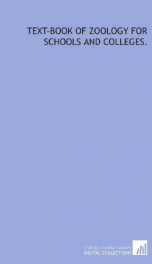
text book of zoology for schools and colleges
Series:
Unknown
Year:
Unknown
Raiting:
4/5
Originally published in 1901. This volume from the Cornell University Library's print collections was scanned on an APT BookScan and converted to JPG 2000 format by Kirtas Technologies. All titles scanned cover to cover and pages may include marks, notations and other marginalia present in the original volume.
Show more
add to favoritesadd In favorites

on the structure and affinities of the tabulate corals of the palaeozoic perio
Series:
Unknown
Year:
Unknown
Raiting:
3/5
Show more
add to favoritesadd In favorites
Book list

The Ancient Life History of the Earth
A Comprehensive Outline of the Principles and Leading Facts of
Palæontological Science
Series:
Unknown
Year:
Unknown
Raiting:
3.5/5
Show more
add to favoritesadd In favorites

text book of zoology for schools and colleges
Series:
Unknown
Year:
Unknown
Raiting:
4/5
Originally published in 1901. This volume from the Cornell University Library's print collections was scanned on an APT BookScan and converted to JPG 2000 format by Kirtas Technologies. All titles scanned cover to cover and pages may include marks, notations and other marginalia present in the original volume.
Show more
add to favoritesadd In favorites

on the structure and affinities of the tabulate corals of the palaeozoic perio
Series:
Unknown
Year:
Unknown
Raiting:
3/5
Show more
add to favoritesadd In favorites

natural history its rise and progress in britain as developed in the life and
Series:
Unknown
Year:
Unknown
Raiting:
4/5
Show more
add to favoritesadd In favorites

manual of palaeontology for the use of students with a general introduction on t
Series:
Unknown
Year:
Unknown
Raiting:
4.5/5
Show more
add to favoritesadd In favorites
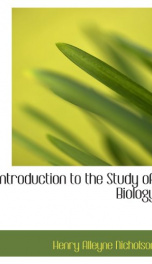
introduction to the study of biology
Series:
Unknown
Year:
Unknown
Raiting:
3.5/5
BIOLOGY - PREFACE - THE present work is based chiefly upon the Introduction to the authors Manual of Zoology, much of which is given here in an unaltered form. A considerable portion, however, of the Introduction has been here recast, whilst fully two-thirds of the work consists of new matter. Illustrations also have been introduced wherever such appeared to be necessary. Many important subjects have, of course, been necessarily treated very superficially, or altogether omitted, as unsuitable for a merely elementary work. It is hoped, however, that most of those subjects are touched upon, a knowledge of which would be useful to the student of living or extinct forms of life, or to the general reader. -- C O N T E N T S -- CHAPTER I. PAGE Definition of Biology-Differences between dead and living bodies - Nature and conditions of life-Physical basis of life-Protoplasm-Connection between life and the matter of life-Organisation - Light - Air - Temperature - Death - Use of the term c vital force, . . . . 1-18 CHAPTER 11. Differences between animals and plants-Regnum Protisticum of Hzeckel-Higher plants distinguished from higher animals-Comparison of the lower animals with the lower plaats-Form-Internal structure-Chemical composition-Power of locomotion-Nature of the food, . . . . . 19-25 CHAPTER 111. Differences between different organisms-Morphology-Physiology - Specialisation of functions-Morphological type-Synopsis of the main divisions of the animal and vegetable kingdoms, 26-43 CHAPTER IV. Analogy - Homology-Serial Homology - Lateral Homology-Homogeny and Homoplasy - Homomorphism - Mimicry-Correlationofgrowth, . . . 44-5 CONTENTS. vii CHAPTER V. Principles of classification-Definition of Species-Genus-Family - Order-Class-Sub-kingdom-Impossibility of a linear classification, . . . . . . 56-63 CHAPTER VI. S Elementary chemistry of animals and plants-Chemistry of animals - Fats-Albumen-Fibrine - Caseine - Proteine of Mulder-Chemistry of vegetables-Starch-Cellulose-Sugar - Albuminous compounds of plants, . . 64-69 CHAPTER VII. Elementary structure of living bodies-Protoplasm or Bioplasmhfolecules - Cells-The cell-wall - The cell-contents - The nucleus-Cell-multiplication, . . . . 70-76 CHAPTER VIII. Physiological functioils of animals and plants-Animal and vege- table functions-Unicellular plants-Foraminifera-Vital force as manifested in the digestive process of plants, . 77-83 CHAPTER IX... --This text refers to an alternate Paperback edition.
Show more
add to favoritesadd In favorites

a manual of zoology for the use of students with a general introduction on the
Series:
Unknown
Year:
Unknown
Raiting:
5/5
This volume is produced from digital images created through the University of Michigan University Library’s preservation reformatting program.
Show more
add to favoritesadd In favorites

a manual of zoology for the use of students with a general introd on the prin
Series:
Unknown
Year:
Unknown
Raiting:
3.5/5
Show more
add to favoritesadd In favorites
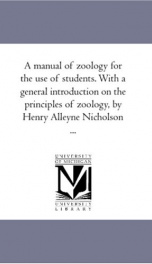
a manual of zoology for the use of students with a general introduction on
Series:
Unknown
Year:
Unknown
Raiting:
2.5/5
This volume is produced from digital images created through the University of Michigan University Library’s preservation reformatting program.
Show more
add to favoritesadd In favorites

a manual of zoology for the use of students volume 2
Series:
Unknown
Year:
Unknown
Raiting:
3/5
Show more
add to favoritesadd In favorites

a manual of zoology for the use of students volume 1
Series:
Unknown
Year:
Unknown
Raiting:
4/5
Show more
add to favoritesadd In favorites
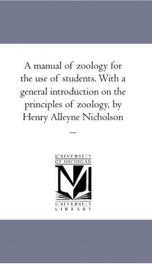
a manual of zoology
Series:
Unknown
Year:
Unknown
Raiting:
4/5
This volume is produced from digital images created through the University of Michigan University Library’s preservation reformatting program.
Show more
add to favoritesadd In favorites

a manual of palontology for the use of students with a general introduction
Series:
Unknown
Year:
Unknown
Raiting:
2.5/5
Show more
add to favoritesadd In favorites
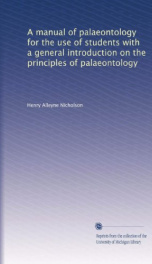
a manual of palaeontology for the use of students with a general introduction on
Series:
Unknown
Year:
Unknown
Raiting:
3/5
This volume is produced from digital images created through the University of Michigan University Library's large-scale digitization efforts. The Library seeks to preserve the intellectual content of items in a manner that facilitates and promotes a variety of uses. The digital reformatting process results in an electronic version of the original text that can be both accessed online and used to create new print copies. The Library also understands and values the usefulness of print and makes reprints available to the public whenever possible. This book and hundreds of thousands of others can be found in the HathiTrust, an archive of the digitized collections of many great research libraries. For access to the University of Michigan Library's digital collections, please see http://www.lib.umich.edu and for information about the HathiTrust, please visit http://www.hathitrust.org
Show more
add to favoritesadd In favorites
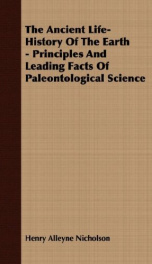
The Ancient Life History of the Earth
Series:
Unknown
Year:
Unknown
Raiting:
3/5
THE ANCIENT LIFE-HISTORY THE EARTH THE ANCIENT LIFE-HISTORY THE EARTH A COMPREHENSIVE OUTLINE OF THE PRINCIPLES AND LEADING FACTS OF PALEONTOLOGICAL SCIENCE BY H. ALLEYNE NICHOLSON M.D., . PREFACE. THE study of Palaeontology, or the science which is concerned with the living beings which flourished upon the globe during past periods of its history, may be pursued by two parallel but essentially distinct paths. By the one method of inquiry, we may study the anatomical characters and structure of the innumerable extinct forms of life which lie buried in the rocks simply as so many organisms, with but a slight and secondary reference to the time at which they lived. By the other method, fossil animals are regarded principally as so many landmarks in the ancient records of the world, and are studied historically and as regards their relations to the chronological succession of the strata in which they are entombed. In so doing, it is of course impossible to wholly ignore their structural characters, and their relationships with animals now living upon the earth but these points are held to occupy a subordinate place, and to require nothing more than a comparatively general attention. In a former work, the Author has endeavoured to furnish a summary of the more important facts of Palaeontology regarded in its strictly scientific aspect, as a mere department of the great science of Biology. The present work, on the other hand, is an attempt to treat Palaeontology more especially from its historical side, and in its more intimate relations with Geology. In accordance with this object, the introductory portion of the work is devoted to a consideration of the general principles of Palaeontology, and the bearings of this science upon various geological problems such as the mode of formation of the sedimentary rocks, the reac- tions of living beings upon the crust of the earth, and the sequence in time of the fossiliferous formations. The second portion of the work deals exclusively with Historical Palaeontology, each formation being consid- ered separately, as regards its lithological nature and subdivisions, its relations to other formations, its geographical distribution, its mode of origin, and its char- acteristic life-forms. In the consideration of the characteristic fossils of each successive period, a general account is given of their more important zoological characters and their relations to living forms but the technical language of Zoology has been avoided, and the aid of illustrations has been freely called into use. It may therefore be hoped that the work may be found to be available for the purposes of both the Geological and the Zoological student since it is essentially an outline of Historical Palaeontology, and the student of either of the abovementioned sciences must perforce possess some know- ledge of the last. Whilst primarily intended for students, it may be added that the method of treatment has been so far untechnical as not to render adopted the work useless to the general reader who may desire l to acquire some knowledge of a subject of such vast and universal interest. In carrying out the object which he has held before him, the Author can hardly expect, from the nature of the materials with which he has had to deal, that he has kept himself absolutely clear of errors, both of omission and commission. The subject, however, is one to which he has devoted the labour of many years, both in studying the researches of others and in personal investigations of his own and he can only trust that such errors as may exist will be found to belong chiefly to the former class, and to be neither serious nor numerous...
Show more
add to favoritesadd In favorites
What readers are saying
What do you think? Write your own comment on this author!
write a commentif you like Nicholson Henry Alleyne try:
readers also enjoyed
What readers are saying
What do you think? Write your own comment on this author!
write a commentGenre
if you like Nicholson Henry Alleyne try:
readers also enjoyed
Do you want to read a book that interests you? It’s EASY!
Create an account and send a request for reading to other users on the Webpage of the book!

